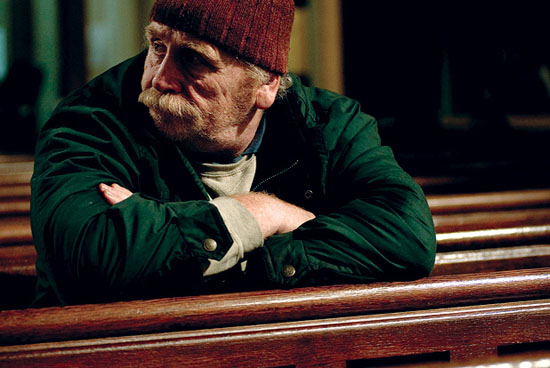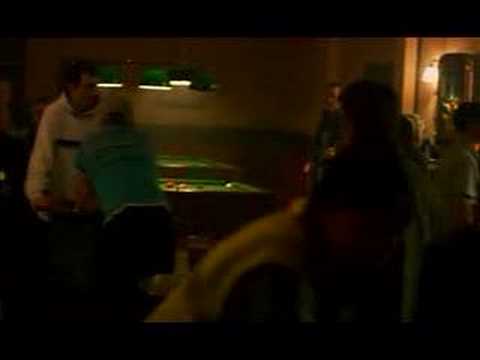Red Road
Known for his mischievous nature (and the odd ill-advised comment), Dogme 95 director Lars von Trier enjoys working with restrictions, most notably in his documentary The Five Obstructions. In 2003, his company Zentropa, working in partnership with Glasgow-based Sigma Films, devised a challenge: three films by first-time directors, set in Glasgow using the same eight characters.
Once the paramenters were set, Danish filmmakers Lone Scherfig (director, An Education) and Anders Thomas Jensen (writer, In a Better World) drew up a list of characters with minimal description, leaving the three chosen directors — Andrea Arnold, Morag McKinnon and Mikkel Norgaard — to take them in whatever direction they chose.
While all three treatments were done at the same time, Arnold, a double threat as writer and director, was first out of the blocks in 2006 with Red Road, a taut thriller-cum-character study focused on Kate Dickie’s fragile CCTV operator scarred by her tragic past.
The second film in the series, Donkeys, received its London premiere at the East End Film Festival earlier this month, along with a special screening of Red Road. Speaking at a Q&A with the cast and crew, producer Anna Duffield of Sigma Films said, "What Lars von Trier said to Morag and Andrea and Mikkel when we had our trip out to Zentropa is: ‘Learn to love the rope. Just go for it.’"
For her part, McKinnon had mixed feelings about the process, finding it freeing and restricting. "These are parameters within which you try to work and it gives you a compass with which to work. It’s liberating because it restricts your choices, which is weird to say, but at the same time it’s constricting because it does actually narrow your options."
In Donkeys, Dickie’s character Jackie is now a supermarket checkout worker whose ne’er-do-well father (James Cosmo) takes centre-stage in the plot, as he tries to tidy up loose ends and reconciling with his children – including one he never knew he had.

Donkeys
Delving into bad taste and comedy of embarrassment, Donkeys dices with assisted suicide and incest, revelling in the black comedy of dysfunctional family relations. While not hitting the heights of Red Road, it is moving, funny and disturbing in parts.
McKinnon explained the shift in tone: "You just are what you are as a filmmaker, as a storyteller. The initial group of characters that were presented, as a person you naturally gravitate to one or the other of the characters for reasons of what your personal interests are. You have to operate through instinct and through your own personal gravitational fields, because otherwise it isn’t meaningful to you. So, you have to choose what is meaningful to you."
Audiences coming to Donkeys by way of Red Road may be confused, as the second film in the Advance Party series is not a continuation of the story, but rather an alternate imagining of the characters: a triptych, rather than a trilogy. But, the films do stand separately, as intended.
Dickie explained: "In terms of acting, I didn’t think about Red Road when I did Donkeys, because I didn’t feel it lent itself at all. They’re completely separate scripts. Although you are kind of playing the same character, there are so many different elements that had changed, that I treated [it] as a stand-alone."
McKinnon offered another comparison. "It reminds me of the Three Colours trilogy, because all the characters end up appearing together. It’s just like different universes… The characters live in different universes because they are different people with different relationships and different structures, so maybe it could be the multiple universe model like they’ve got in quantum physics."
The third part of the series is yet to be shot. Asked about it, McKinnon replied, "Mikkel has kind of gone off into the hinterland", while Duffield explained diplomatically that Norgaard was busy and the script was in development. "We are hoping he’ll come back." No date was given for production to start.
Whereas Zentropa operates within an established film-making community in which collaboration is the norm, the UK film industry is more fractured and competitive. Duffield described a kind of filmmaking paradise at Zentropa: "It’s all about cross-collaboration, all the writers can meet up and have lunch together. All the directors can—" Here McKinnon interjected drily: "Unfortunately, we don’t quite have that model in Scotland."
The chief advantage of the Advance Party concept in the UK may be in attracting funders to first-time filmmakers. Certainly, Duffield has considered that angle. "From the experience we have had at Sigma of working with people who are ready to make their first feature, it is a big leap from a short to a feature film. Especially at the moment, as the industry shifts and changes, it’s hard to get features off the ground. So, it’s a nice kind of package; it’s an interesting concept."




